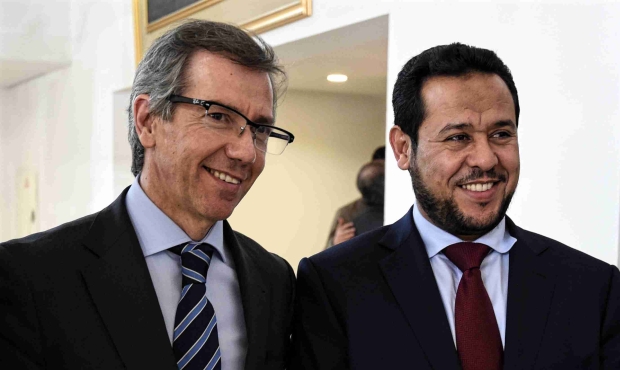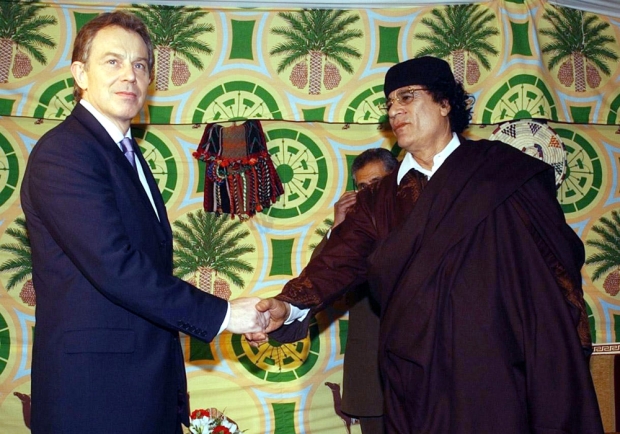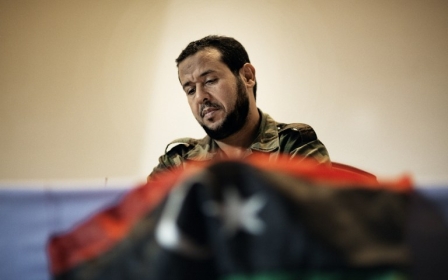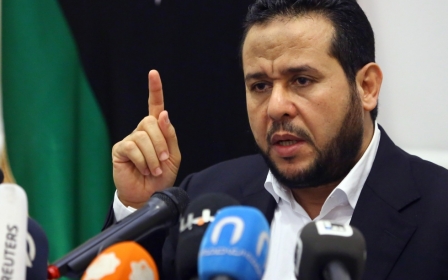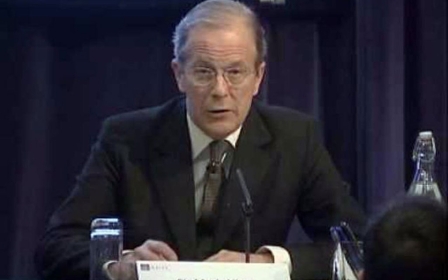Libyan torture victim Belhaj vows to fight case against UK 'to the end'
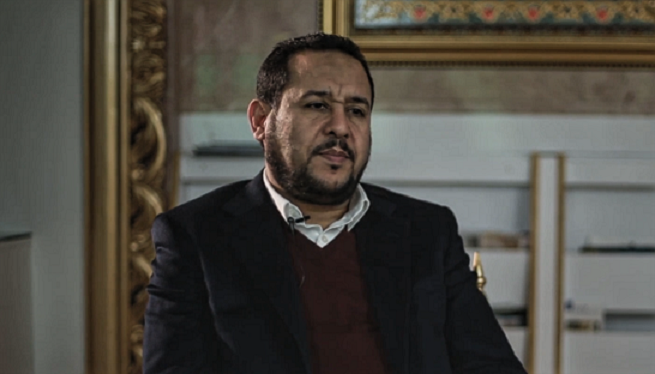
ISTANBUL, Turkey - He was tortured for six years in former Libyan leader Muammar Gaddafi’s prisons following his kidnap and rendition in an operation involving both British and American security agencies.
Now Abdel Hakim Belhaj, a key figure in Libya's post-Gaddafi fractured political landscape who now leads the Watan Party in Tripoli, has told Middle East Eye that he intends to pursue his quest for justice "to the end" after the UK's top court ruled that he could bring a case against the British government and individual officials including the former foreign secretary Jack Straw.
Smartly dressed in a burgundy sweater and dark blazer – while simultaneously flicking on his prayer beads – Belhaj reiterated that all he wanted from the government was an admission and apology for what he and his wife had endured.
'I am not interested in revenge, but only for the British government or those involved in the case to admit to and apologise for what happened'
- Abdel Hakim Belhaj
“I am not interested in revenge, but only for the British government or those involved in the case to admit to and apologise for what happened,” he said.
Belhaj and his then-pregnant wife Fatima Bouchar were seized with their four children in Bangkok in 2004 while travelling to the UK to claim asylum and transferred to Tripoli in a joint MI6-CIA operation.
A former militant leader with the anti-Gaddafi Libyan Islamic Fighting Group (LIFG), he was subsequently imprisoned for six years during which time he says he was routinely tortured and mistreated.
The case came to light after the fall of Tripoli in 2011, when faxes from MI6’s then-counter-terrorism director Mark Allen, describing the rendition flights, were found in the ransacked office of Moussa Koussa, Libya’s head of intelligence.
On 17 January the UK Supreme Court ruled that Belhaj could launch a civil case against British officials, including Allen and Straw, for their role in the abduction.
READ: Tortured Libyan dissident wins right to sue UK government
Belhaj's case, and that of another Libyan dissident Sami al-Saadi whose family was also abducted and rendered to Libya, has already been investigated by British police who accumulated nearly 30,000 pages of evidence over a five-year period. But proscutors said last year there was insufficient evidence to press criminal charges.
Belhaj said the announcement had left him demoralised but intent on pursuing the case.
"I am not so sure I will win, but I'm going to stick with it until the end," he explained.
Belhaj’s lawyer Cori Crider previously told MEE: "The documents show - pretty much in black and white - a joint CIA/MI6/Libyan effort to abduct him and his wife and send them back to Libya."
READ: Moazzam Begg on the Belhaj ruling
“Because of the Tripoli files we don't just know from our client's testimony what happened, we know from [the government's] own contemporaneous documentation.”
One of the documents uncovered included a fax sent by Allen to Libyan authorities in March 2004, saying that it was Britain, and only Britain, who should take credit and reap the rewards of Belhaj's abduction.
‘Only an apology’
While the Saadi family received a £2m ($2.5m) settlement two years ago, Belhaj is seeking an apology and a symbolic £1 ($1.24) payment from each of the defendants.
When asked whether he had ever been offered money to drop the case, Belhaj told MEE: “This experience inflicted a lot of pain and suffering upon me and my family and caused us much distress, the effects of which we felt for many years, and which we, and especially my wife, still suffer.
Supporters say the case represents one of the few remaining opportunities they have of exposing the role played by the UK government in rendition.
‘Sacrificed for a deal’
Belhaj's abduction came at a time when Britain’s government under prime minister Tony Blair was wooing Gaddafi's sanctions-crippled Libya as a potential ally in the so-called "War on Terror" launched by the US against al-Qaeda and allied Islamist militants as well as eyeing lucrative oil contracts for British firms.
The US deemed the anti-Gaddafi LIFG, which was formed in 1990 by Islamist Libyans who had fought in Afghanistan against Soviet forces in the 1980s, to be a terrorist group allied with al-Qaeda.
But Belhaj denied that any links between the group and al-Qaeda existed and said he believed that his rendition to Libya was part of a covert deal between Blair and Gaddafi, who was ousted and killed in a popular uprising in 2011.
'Blair literally stepped all over the values and principles of human rights and justice which I had thought the West and particularly the UK upheld and fought for'
- Abdel Hakim Belhaj
"When I was kidnapped in Bangkok airport, I told them [kidnappers] that if I was wanted by the the American courts, I would be happy to go and stand trial. But I was clearly told that I was not," he added.
The rendition occurred days before Blair met Gaddafi in a tent outside Tripoli in 2004 to seal the so-called "Deal in the Desert" that brought the long-term opponent of the West in from the cold.
“I found myself sacrificed for the sake of a deal,” he said. “Blair literally stepped all over the values and principles of human rights and justice which I had thought the West and particularly the UK upheld and fought for,” he added.
READ: Belhaj ruling brings fresh scrutiny on Blair-Gaddafi 'deal in the desert'
At the same however, Blair’s 2005 tent visit to Gaddafi also paved the way for the subsequent announcement that British Petroleum (BP) had signed a £450m ($558m) agreement to drill for oil in Libya. Officials travelling with Blair at the time said that if all this exploration reached its full potential the deal could be worth £13 billion ($16.1bn).
Anglo-Dutch oil giant Shell also signed a deal worth up to £550m ($682m) to buy gas exploration rights off the Libyan coast.
'The man I was handed over to [Gaddafi] and the man heading the Libyan intelligence services at the time [Koussa] was wanted by the British justice system'
- Abdel Hakim Belhaj
“I was completely shocked to find documents that clearly indicated the complicity of the British intelligence with an establishment [Libyan intelligence] that is known for disregarding the most basic human rights,” Belhaj told MEE.
“The man I was handed over to [Gaddafi] and the man heading the Libyan intelligence services at the time [Koussa] were wanted by the British justice system,” he added.
Belhaj alleged that Gaddafi and Koussa were involved in the assassination of British policewoman Yvonne Fletcher near the Libyan embassy in London in 1984 and were responsible for the downing of a Pan Am flight over Lockerbie in Scotland in 1988, the French UTA flight over the Sahara desert in 1989 and numerous attacks in Europe during the same period.
READ: Libya rendition case put Britain in the dock over torture
“It is ironic and sad - despite the UK government being aware of these incidents - that I was handed over to this regime,” he said.
During the fall of the Gaddafi regime in 2011, Koussa, then Libya’s foreign minister, unexpectedly flew to London and then to Qatar – to the fury of Lockerbie campaigners who believed he may have had deep knowledge of the Lockerbie bomb plot.
The only man convicted of bombing the airliner – Abdelbaset al-Meghrahi, who died of cancer in 2012 – was released from a Scottish prison soon after BP signed a further $15bn oil deal with Libya in 2009. Straw revealed in a leaked letter in the same year that negotiations of the oil deal had included talk of his release.
This article is available in French on Middle East Eye French edition.
New MEE newsletter: Jerusalem Dispatch
Sign up to get the latest insights and analysis on Israel-Palestine, alongside Turkey Unpacked and other MEE newsletters
Middle East Eye delivers independent and unrivalled coverage and analysis of the Middle East, North Africa and beyond. To learn more about republishing this content and the associated fees, please fill out this form. More about MEE can be found here.


